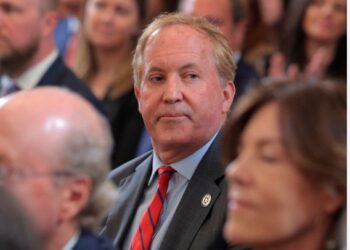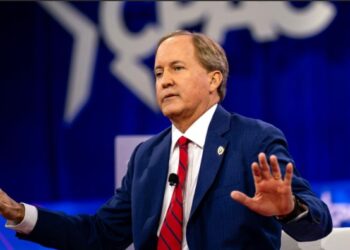The election of 2024 will pivot on many issues, inflation, the stagnant economy, open borders, crime, but these issues illuminate a deeper and a more important one. The elephant in the room is two competing visions of the United States. While the United States is divided in myriad ways, by class, race, the two coasts vs. flyover country, the most significant, even existential, is its ideological division between most Americans who remain believers in America’s traditional ideology of liberalism—which animated the American Revolution of 1776—and a powerful elite who believe in ideals of the first Communist (Bolshevik) revolution of 1917. The 2024 election will determine which controls American politics, likely for a very long time.
The American Revolution of 1776 was a struggle against the tyranny of the British government motivated by political liberalism. Liberalism is America’s traditional political ideology. It promises liberty for the individual, respect for individual rights, and the rule of law, all have inalienable rights and individual freedoms. This concern for rights is the basis of liberalism’s individualism. Rights are designed to maximize the amount of freedom individuals have in their daily lives, which allows them to lead the best and most fulfilling life possible.
Freedom means the ability to act without fear of government intrusion, and include freedom of speech, freedom of the press, of religion, of association, and the right to hold property. Liberalism also assumes that individuals differ, sometimes fiercely, about political, economic, and social issues. But these differences, however sharp, will be resolved through established political mechanisms, that is principally by free and transparent elections, via federal, state, and local government, and the courts. James Madison famously wrote in Federalist 51, "if men were angels, no government would be necessary.” But as men are not angels, elections and the government exist to protect freedoms from threats that might emanate from within the society or outside of it. Informal tools are also important for liberalism, such as a vigorous free press for debate and the expression of opinion, freely and without censorship.
The impact of this ideology is ubiquitous in American history. Liberalism and its values and principles are expressed in America’s founding documents: the Declaration of Independence, the Constitution, and the Bill of Rights, as well as in Abraham Lincoln’s Gettysburg Address, and have been echoed in American political ideas, practices, tradition, and culture since 1776.
This ideology has served as the cement American politics for centuries and permitted the U.S. to avoid the ideological upheavals that plagued other states. No longer. Liberalism is now challenged by progressivism, which is rooted in Communist revolution of 1917.
That revolution was the attempt to remake not only Russian society but Western ones. By any account, it has been extremely successful for an ideology that has led to disaster wherever it was imposed. From its genesis in Russia, it spread to Europe, China, and much of the elite of the United States, even as Russia and eastern Europe were able to free themselves from it. Succinctly, it is defined by four major elements. The first is the rejection and hatred of Western civilization and bourgeois (or middle class) social, economic, religious, and political order and the determination to destroy it. To advance that end, Communists are indefatigable in their efforts to destroy liberal governments, bourgeois societies, and Western civilization. Today, these arguments do not use the term bourgeois but employ neologisms—they seek to overthrow the "patriarchy,” fight "structural racism,” or "oppressors” of "the oppressed,” and the "colonizers” on behalf of the "colonized.”
Second is the elimination of individual freedom, rights, and identity in favor of collective identity, and the abolition of private property in favor of a forced collective identity and ownership.
Third, by definition, Communism is totalitarian. State power is conducted through a single political party, the Communist Party. Wherever they are in power, Communists rule illegitimately because they do so without popular consent. In turn, due to their illegitimacy, they resort to ever more coercive measures to be used against the people. This ends inevitably in mass executions, deportations, famine, and the Gulag. Communists from Lenin to Cambodian Communist Pol Pot labor to remake societies from a "Year Zero.” Pol Pot slaughtered about 1.5-2 million people—about 25% of the Cambodian population between 1975 and 1979. Vice President Kamala Harris is fond of speaking of "what can be, unburden by what has been,” as she deceitfully advocates for an American Year Zero.
Fourth, the Bolsheviks employed an ingenious device to spread the revolution to other countries. The Third International, better known as the Communist International, or Comintern, was founded in 1919. The point of the Comintern was to penetrate societies, undermine them, and promote Communist revolution, as directed by Moscow. This occurred from the United States to Spain, to India, to China, and scores of other countries. Comintern agents operated through front organizations and local Communist Parties to advance their ideology. Today, Americans witness echoes of the Comintern in the PRC’s United Front Work Department and related front organizations in the U.S. today.
Bolshevik ideas were modified by Western Communists, most importantly the Frankfurt School and the Italian Communist, Antonio Gramsci, who recognized the Communist revolution would come through other means—through the "ideas industry,” universities, education, media, and popular culture. From the ideas industry, Communists would within short order gain political influence and then political control.
Thus, for well over a century, the U.S. has faced the threat of Communism both through the efforts of the Comintern (renamed Cominform in 1947) operating through front organizations, agents of influence, and formal Communist Parties, but also the efforts of the Western Communists, operating through the ideas industry and under the guise of progressivism.
Progressivism has flowered throughout American society, but especially in universities, journalism, K-12 education, popular culture. Today, it advocates of Critical Race Theory (CRT) in American politics and society. This has led to the subsequent and related injection of Diversity, Equity, and Inclusion (DEI) into all forms of public life and nearly all private life. Communists are relentless in advancing their goals and will not tolerate a private sphere to remain independent of their control. Hence, it will be only a brief time before all private life is measured by the Procrustean Bed of DEI.
I have argued elsewhere that the U.S. is at a "1776 Moment” of ideological transformation. 1776 was a change from the absolutism of the British monarchy to liberalism. If it is successful, today’s ideological transformation will be from liberalism to Communism. Thus, the U.S. faces a revolutionary change in its polity which is being imposed from above, from the elite who support this. This moment is more precarious and graver than in previous periods of unrest in American history. Those periods were debates, however intense, within the ideology of liberalism, not a change in ideological paradigm from freedom to totalitarianism—if the progressives are successful.
The present struggle between the traditional American ideology of liberalism and progressivism will answer the greatest question of American politics in the 21st Century: either liberalism will have a renaissance and defeat Communism in the guise of progressivism, or Communism will win, extinguishing liberalism and opening the darkest period in American history.
The country is on the cusp of this period now. Uncontrolled government debt, lawfare against political opponents, a considerable majority of Americans telling pollsters the country is on the wrong track, open borders, scores of millions of forgotten Americans, a compromised president and failed presidential leadership, a world on fire—it is an eerie parallel to when the Bolsheviks said "the worse, the better,” that is, the worse things were for the Tsar’s government and for the Russian people, the better for the Bolsheviks.
Thus far, the events of 2024 have been uniquely weird in American political history—and we not out of the woods. There seems to be a general unease that other shoes have yet to drop—perhaps a war, massive cyber-attack, riots, assassinations, or "black swan” event.
Of course, 2024 is very usual in the American context—it’s weird if you think like an American, it is not weird if you think like a Communist, chaos and crises are needed to advance the agenda. What has occurred in 2024 is a symptom of a great ideological tension between an elite who seek to impose Communism on the U.S. and the vast majority of Americans who wish to live as their families have in this country—governed by the ideology of liberalism and the freedom and way of life it entails. In 2024’s cavalcade of historical events, a presidential debate occurs at an artificial time, before either of the candidates were the nominees but where President Biden’s dementia was displayed, thus allowing the media to question—in unison and instantaneously—his fitness. President Trump survives an assassination attempt. President Biden chooses not to run after one or more visits from the Don Corleone and Luca Brasi of the Democratic Party. Vice President Harris becomes the nominee for President, without going through the primary process. She did not earn one vote from primary voters but was installed by Party leadership. This was accomplished without objection within the Democratic Party, their voters and elected representatives, and the media—and, indeed, all Americans. One might be forgiven for thinking that there was a plan, and all the actors are following a script in a carefully written and choreographed performance. American voters have nothing to do with it. A Leninist party could not have done better than the Democrats have. Vladimir Lenin and Mao Zedong are looking up from Hell, smiling at the accomplishments of their progeny.
Every election is important. However, the 2024 election is an existential election for America. Increasingly, Americans recognize this. For many, it may be ineffable, but they know it in their gut. The outcome of 2024 will have profound consequences for the country. Those Americans who have not supported Trump must realize the stakes, including Americans who did not like mean tweets to Silicon Valley and Wall Street billionaires—despite what they might think, they will not be able to escape tyranny’s grasp in their Portuguese, Swiss, or New Zealand bolthole. The revolution will find them. The path to ensuring the survival of America’s political wellbeing and way of life for all Americans is with Trump. Guaranteeing that America’s political ideology, values, and culture survive is dependent upon victory for the Trump/Vance ticket. Trump’s victory opens the door to a resurgence of America’s ideology, nation, and of the "Spirit of 1776.” There is reason to believe the best years for freedom are ahead if, and these are mighty ifs, there is a free and fair election in 2024, the post-election process proceeds as it should to January 20th, 2025, and the MAGA movement can bridge to Trump’s successors. The U.S. is moving quickly down a path that will end in totalitarianism. Trump’s victory is the only chance to stop that and save America from tyranny.
Bradley A. Thayer is a Contributing Columnist for Warroom and is @bradleythayer on Gettr and Truth, and @bradthayer at X. He is the coauthor with James E. Fanell of Embracing Communist China: America’s Greatest Strategic Failure.





